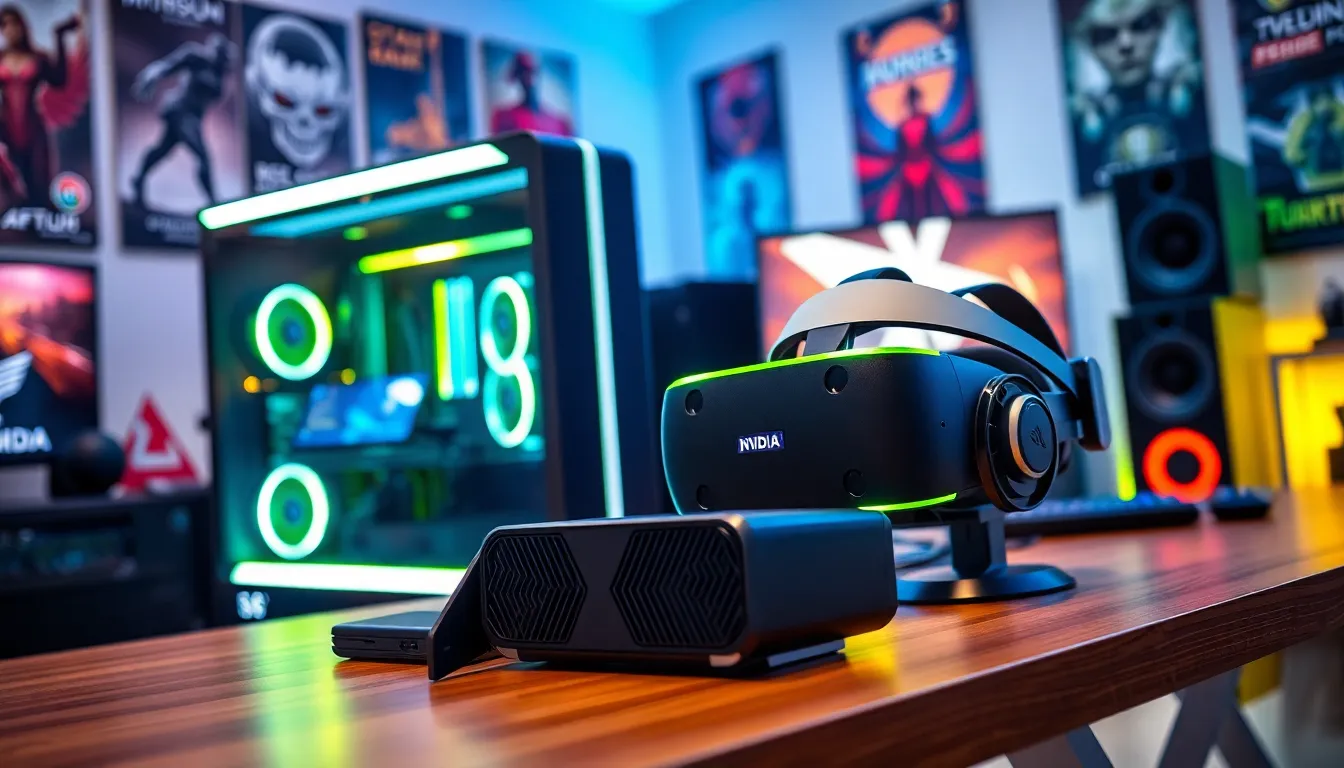Virtual reality gaming has exploded into a thrilling realm where players can step into fantastical worlds and leave reality behind. But to truly enjoy this immersive experience, a powerful VR gaming PC is essential. It’s like having a magic wand that transforms your living room into a dragon-infested castle or a high-speed racetrack.
vr gaming pc
A VR gaming PC serves as the foundation for an immersive gaming experience. Equipped with powerful hardware, it ensures smooth performance and stunning graphics. Key components include a high-end processor, sufficient RAM, and advanced graphics cards capable of rendering high-resolution environments.
Processors like Intel Core i7 or AMD Ryzen 7 provide the necessary speed and efficiency. Graphics cards such as NVIDIA GeForce RTX 3060 or AMD Radeon RX 6700 XT deliver exceptional visuals, enhancing realism in virtual environments.
RAM capacity also plays a critical role; 16GB serves as the minimum for optimal VR performance. Storage options should focus on SSDs for faster load times and improved gameplay experiences.
Cooling systems help maintain performance during extended gaming sessions. VR headsets often generate heat, making efficient cooling a priority.
Furthermore, connectivity options are vital. USB ports, HDMI, and DisplayPort ensure seamless connection with headsets and other peripherals.
Players benefit from a dedicated gaming space to maximize immersion. Room size influences tracking performance, with larger areas allowing for more freedom of movement.
Understanding specifications impacts purchasing decisions. A well-rounded VR gaming PC not only enhances enjoyment but also supports future technological advancements in gaming.
Investing in quality components leads to long-term enjoyment and solid upgrades as new technologies emerge. Each component contributes to an overall experience that transports players into fantastical realms, making a powerful VR gaming PC essential for any serious gamer.
Key Components of a VR Gaming PC

A VR gaming PC requires specific components to ensure an immersive experience. Essential hardware choices make all the difference when addressing performance and overall enjoyment.
CPU Requirements
High-performance CPUs are vital for VR. Intel Core i7 and AMD Ryzen 7 provide strong processing power, enhancing gaming experiences. Players depend on these CPUs for seamless multitasking and high frame rates. Low latency and efficient handling of VR environments help maintain immersion. Optimal choices ensure gameplay remains smooth during intense action scenes.
GPU Specifications
The graphics processing unit (GPU) plays a critical role in VR gaming. NVIDIA GeForce RTX 3060 and AMD Radeon RX 6700 XT are popular choices for their visual capabilities. Current GPUs support ray tracing and advanced rendering techniques, enhancing realism in virtual environments. An adequate GPU can significantly improve frame rates, thereby reducing motion sickness. Selecting the right GPU contributes substantially to lifelike graphics and overall satisfaction.
Memory and Storage
Having sufficient memory and storage impacts VR performance. A minimum of 16GB RAM is recommended, allowing for smooth gameplay and multitasking. Fast SSD storage is essential for quick load times, minimizing wait periods during gaming sessions. SSDs provide speed advantages over traditional hard drives, ensuring seamless transitions between scenes. Balancing memory and storage options maximizes responsiveness, adding to an enjoyable experience.
Benefits of VR Gaming PC
Experiencing virtual reality (VR) gaming on a high-performance PC offers numerous advantages. Immersion ranks as the top benefit, with advanced hardware enabling gamers to step into lifelike environments where every detail captivates attention.
Enhanced graphics play a significant role in creating realistic visuals. High-end graphics cards like the NVIDIA GeForce RTX 3060 or the AMD Radeon RX 6700 XT deliver stunning imagery that brings game worlds to life. Players benefit from smoother frame rates, reducing motion blur and enhancing overall satisfaction.
Competitiveness increases as well, thanks to increased responsiveness. Powerful CPUs, such as Intel Core i7 or AMD Ryzen 7, contribute to precise control during fast-paced gameplay. Gamers find themselves making quick decisions in an environment that feels instantaneous.
A well-constructed VR gaming PC minimizes lag and loading times, ensuring minimal interruptions. SSD storage enhances speed, allowing users to jump into games without long wait times.
Room-scale tracking enhances player interaction within their gaming area, providing freedom to move and explore. With a dedicated space for gaming, tracking accuracy improves, further enriching the player’s experience.
Compatibility with various VR headsets is another notable benefit. High-quality PCs support multiple device integrations, increasing versatility. This adaptability encourages exploration of numerous VR titles across different platforms.
Investing in a VR gaming PC also prepares users for future advancements in technology. New updates and ambitious game titles will demand more from hardware, ensuring long-term usability.
Overall, embracing VR gaming on a powerful PC not only elevates enjoyment but also positions gamers at the forefront of evolving gaming experiences.
Popular VR Gaming PCs
The variety of VR gaming PCs available today offers options for every type of gamer. Selecting the right PC enhances the VR experience significantly.
Brand Comparisons
Several leading brands dominate the VR gaming PC market, each providing unique features. Alienware delivers high-performance systems known for sleek designs and robust hardware configurations. MSI focuses on gaming ambiance through customizable RGB elements and effective cooling systems. HP’s Omen series presents versatile performance, ideal for gamers seeking a balance between work and entertainment. Razer emphasizes aesthetic appeal with powerful components, catering to gamers who prioritize style. Each brand brings strengths, appealing to different preferences and budgets.
Price Ranges
Price ranges for VR gaming PCs vary widely, accommodating diverse budgets. Entry-level systems typically start around $800, featuring essential components for basic VR gaming. Mid-range options fall between $1,200 and $2,000, offering enhanced performance and graphics for more demanding titles. High-end VR gaming PCs can exceed $2,500, showcasing top-of-the-line hardware and premium features, supporting the most immersive gaming experiences. Understanding these price points helps gamers find the right balance between performance and affordability.
Setting Up Your VR Gaming PC
Setting up a VR gaming PC involves configuring both hardware and software for optimal performance. Carefully following the setup process ensures a seamless gaming experience.
Hardware Setup
Begin by connecting all hardware components. Install the CPU and RAM on the motherboard, then insert the graphics card into the PCIe slot. Ensure the power supply unit is sufficient to support high-demand components. Next, connect SSD storage, which promotes faster data access. Set up cooling systems to manage temperatures effectively during gameplay. Cables should connect the monitor through HDMI or DisplayPort, enabling visual output from the GPU. USB ports must be linked to peripherals, such as VR headsets and controllers. Proper cable management enhances aesthetics and accessibility to ports.
Software Installation
Install the operating system first, as it serves as the foundation for all future software. Next, download drivers specific to the motherboard and GPU to optimize performance. Services like SteamVR and Oculus software provide essential tools for accessing VR content. Update software regularly to ensure the best experience and security. Configure headset settings straight from the portals of respective software, adjusting parameters such as resolution and refresh rate. Finally, install VR games through digital distribution platforms, making them accessible for immersive gameplay.
Conclusion
Investing in a VR gaming PC is a game-changer for any serious gamer. It not only enhances immersion but also ensures smooth gameplay and responsiveness. With the right components players can dive into stunning virtual worlds that feel incredibly real.
As technology continues to evolve the importance of a powerful VR setup will only grow. Gamers should prioritize quality hardware to future-proof their systems and fully enjoy the latest advancements in virtual reality. A well-constructed VR gaming PC is more than just a purchase; it’s an investment in unforgettable gaming experiences.

